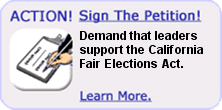
Sonoma County Residents Say Yes to Proposition 15, the California Fair Elections Act
![]() State Senator Mark Leno, Santa Rosa Mayor Susan Gorin, Cloverdale Mayor Carol Russell and Petaluma City Council Member David Glass Join State and Local Leaders to Support Proposition 15, California Fair Elections Act on June Ballot
State Senator Mark Leno, Santa Rosa Mayor Susan Gorin, Cloverdale Mayor Carol Russell and Petaluma City Council Member David Glass Join State and Local Leaders to Support Proposition 15, California Fair Elections Act on June Ballot
Santa Rosa - On the heels of the recent U.S. Supreme Court
ruling on corporate money's role in elections, State
Senator Mark Leno (D - San Francisco), Santa Rosa Mayor
Susan Gorin, Cloverdale Mayor Carol Russell, Petaluma City
Council Member David Glass came together with community
leaders today to educate the Sonoma County community about
Proposition 15, the California Fair Elections Act, a ballot
proposition which would get elected officials out of the
fundraising game and focused on solving California's
problems.
"Candidates have to spend way too much time fundraising
under the current system," said State Senator Mark Leno.
"If we had Fair Elections public financing of campaigns,
elected officials would be able to focus entirely on the
public policy work they were elected to do rather than fund
raise."
Since 2000, over $1 billion has been raised by California
politicians, buying special interests unprecedented access
but shutting out the rest of us. That's why polls show
nearly three out of four voters want to change the way
elections in California are financed.
"Increasingly, typical California voters of every party
agree that the relentless influence of special interest
money shuts our voices out of the debate," said Cloverdale
Mayor Carol Russell. "That's one reason I support
Proposition 15, the California Fair Elections Act - to
regain our rightful place by beginning to break the
unhealthy connection between political donations and public
policy."
Authored by Senator Loni Hancock (D-Oakland) and signed by
Governor Schwarzenegger, the California Fair Elections Act
would establish a voluntary pilot project for California's
Secretary of State races in 2014 and 2018. Candidates would
qualify for public financing if they agree to strict
spending prohibitions and raise a large number of $5
contributions from Californians. The pilot program would be
funded primarily by fees on lobbyists, lobbying firms, and
lobbyist employers, with no taxpayer dollars going to
candidates.
A version of the California Fair Elections Act is already
in place in seven states and two cities. Nearly 400
candidates were elected using only fair elections funding
in their 2008 campaigns, and the programs enjoy popular
support across party lines. National surveys show that two
out of three voters support public financing.
"I support Proposition 15, because under a fair elections
system, candidates from any background who show a broad
base of support can run for office," said Santa Rosa Mayor
Susan Gorin. "Sadly, financial barriers have kept many
talented women and other financially-challenged candidates
from running for elected office. Passing Proposition would
open the political process to candidates of all
backgrounds."
When these financial barriers are eliminated, as they have
been in Arizona and Maine, more women and people of color
are allowed to run for office. In Arizona, Former Governor
Janet Napolitano was elected under the fair elections
system and the number of Latino and Native American
candidates running for office nearly tripled in the first
year that the system went fully into effect, from 13 in
2000 to 37 in 2002.
Voters are ready for elections that money can't buy. In an
October 2009 survey, likely June 2010 voters supported the
California Fair Elections Act by a nearly 3-1 margin.
Support held strong across all political parties and
geographic regions of California with support of 65% among
Latinos, 65% among Democrats, 65% among independents, and
59% among Republicans.
"Under a fair elections system, elected officials truly
represent voters, not campaign donors," said Trent Lange,
chairman of the California Fair Elections Campaign. "Public
financing has freed elected officials across the country to
pass bi-partisan, groundbreaking legislation that is only
possible when our leaders do not fear retribution from
powerful special interests."
# # #
(In accordance with Title 17 U.S.C. Section 107, this material is distributed without profit to those who have expressed a prior interest in receiving the included information for research and educational purposes.)

